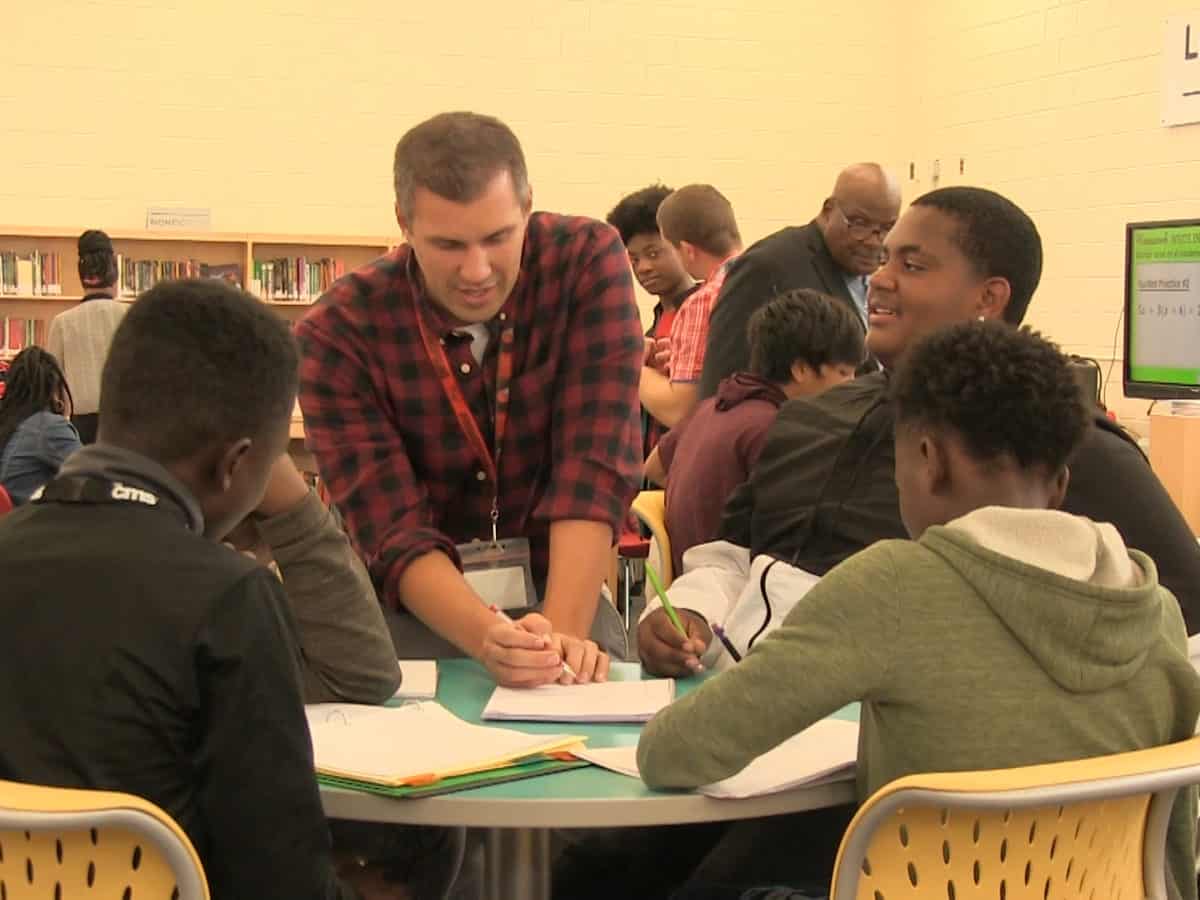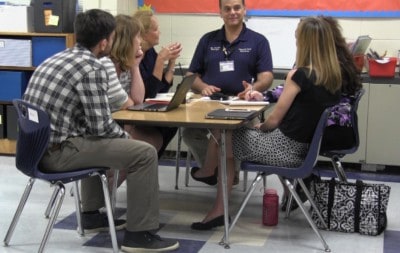

Opportunity Culture kept me from leaving the classroom.
When our first child was born, my wife and I discussed our goals. There was just no way I was going to be able to support our family by being a teacher in North Carolina. It wasn’t what we wanted our family life to look like.
I worked for my National Board certification, and I got my master’s degree to counteract day care and health insurance costs, but it wasn’t enough. I began really thinking about leaving: I’m five years in; can I really do this for 25 years?
I started having conversations with my principal, and the option to move into administration came up, but I didn’t really have a passion for that.
Then Opportunity Culture came to my school.
I became a multi-classroom leader, or MCL, and I’m now at my second school as an MCL leading a six-person math teaching team in grades six through eight. The chance to be an MCL — leading a team of mostly very young, inexperienced teachers through deep guidance and support on instruction, classroom management, planning, and data analysis — allowed me to move up and experience different levels of leadership, and influence the different ways that successful people grow.
The pay supplement MCLs get, which ranges in Charlotte-Mecklenburg Schools from $11,250 to $18,250, and the ability to impact more than just one classroom was a real blessing. It allowed me to stay in a career that I think I was made for. It allowed me to keep teaching and provide for my family in ways that six years ago seemed impossible.
Without Opportunity Culture, I would have been just another man who started in education and shifted to something else when life happened.
I started as a K–8 teacher because of the lack of male educators there. It’s been well-documented how much that matters for students who we know, statistically, are coming from homes where they are not necessarily living with mom and dad, or don’t have a male role model.
And students deserve diverse male voices — white, black, Hispanic, American Indian, and more.
At my previous school, I was the only white male — student or staff. That group of students genuinely wondered why I was there. Why didn’t I go teach in a white school? Some of them honestly thought I was part of the Ku Klux Klan, because they thought all white people were in the KKK.
I discovered how powerful it was for the students to see a white person that cared about them — authentically and truly cared. For a lot of them, I was the first white person they really got to know.
So while I worried about supporting my family, I also saw every day the difference I made in students’ lives. We’re saving lives here. We’re moving kids up; we’re trying to eliminate not only the achievement gap but also the lack of economic mobility.
Becoming an MCL meant not only did I not leave teaching, but I kept others in as well. Many of my team teachers have told me they would have quit, too, were it not for the support I could give them now.
On our team, we can have real, open conversations where I’m not hitting you over the head with your classroom struggles. Instead, we’re focusing on the small steps of success and tracking your — and your students’ — growth, academically and emotionally.
I sometimes tell my teachers stories of discovering how I affected my students — often years later.
Last summer, I went to dinner with my family, and the hostess said, “Oh my gosh, I was just talking about you.” I realized from her name tag that I taught her years ago. “Yeah,” she said, “In my class we were talking about teachers, and I was just talking about what a kind man you were.”
Another night, I stopped at a fast food restaurant, and a former student approached me. As soon as I said I remembered him, he made it clear he still wanted to live up to my expectations by quickly replying, “I’m not just working here — I’m going to college in the fall.”
Still another student from several years back, who had lost her sight, came to visit. She told me about a special school she was attending, and her plans to be a lawyer. “You know,” she said, “It’s really funny, because when I’m doing my math, I just hear your voice still, asking us, ‘what is the question?’”
And then there was Michael. Michael was one of those kids I just didn’t want to see in my class. Every day, it was “Sit down, Michael. Stop talking, Michael. Michael, do your work. Michael, you are better than this.” He frustrated me because I saw potential in him, and he wasn’t meeting it. I held him to the expectations that I thought were best for him, and we went at it constantly.
A few years later, I got called to the office — and there’s Michael. He’d grown about a foot, now this big, broad kid. I said, “Michael, what are you doing here?” and he answered, “Hey, I wanted to tell you that I’m going to college.”
I thought he was going to rub it in my face. But he didn’t — just the opposite.
“You never let up on me. You always told me I could be more, and I just wanted you to know I’m going to college, and I’m going to play baseball there,” he said.
These encounters never fail to blow me away — when we’re in it, we don’t think we’re making that impact. Teachers don’t think that somebody will remember your voice three years later, or your kindness eight years later. Or that a kid is going to come back four years later to announce his college plans.
We never know what might stick down the road. But treat each day as new, and treat each kid with the love that you would want for your own, and the benefits will come — someday.
I didn’t want to give up the chance for more Michaels. With Opportunity Culture, I didn’t have to.




